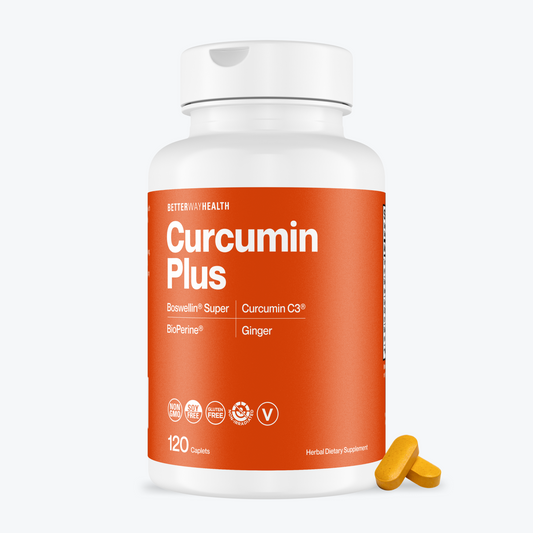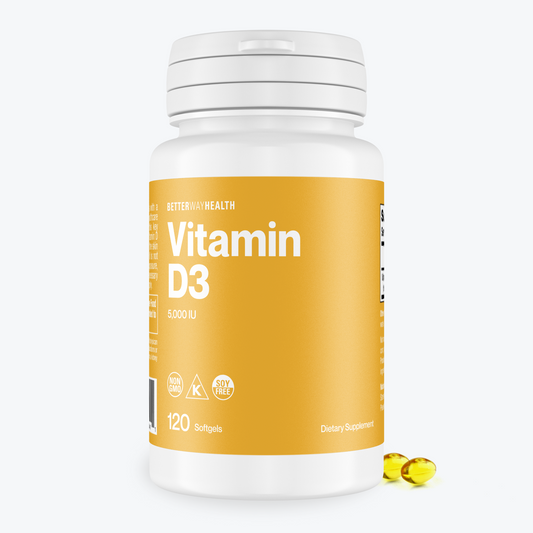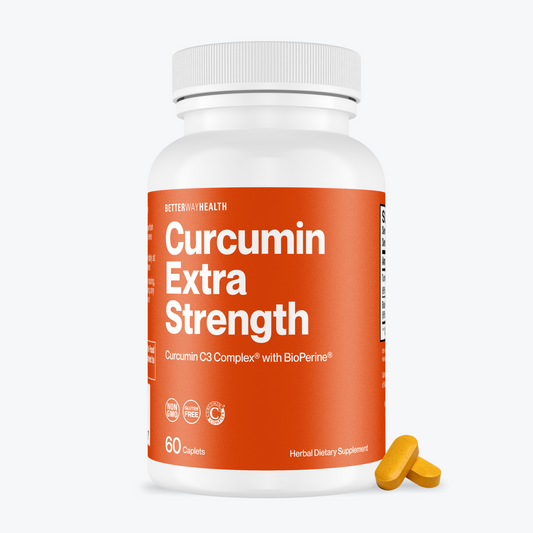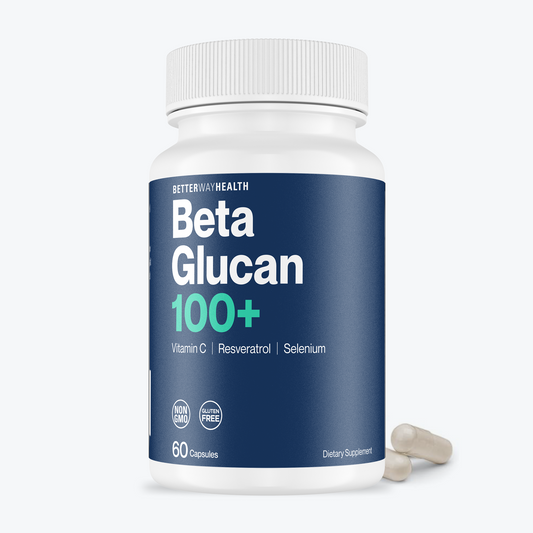Prebiotics vs Probiotics: What They Are and Why They Matter

Maintaining a Healthy Immune System Starts in the gut. Without the right balance of nutrients and supplements, poor gut health can lead to weak immunity.
One of the best ways to stay on the path to a healthy gut is by using prebiotics and probiotics. Both work together in our gastrointestinal tract to promote a balanced microbiome, yet their roles and sources are distinct.
In this resource, we will explore the differences between prebiotics and probiotics, their functions in our bodies, as well as natural food sources rich in these elements.
Understanding Prebiotics and Probiotics
In recent years, there has been a growing interest in maintaining gut health through the consumption of probiotic supplements and foods. (1)
To gain insight into their advantages, it's critical to differentiate between prebiotics and probiotics as well as comprehend how they collaborate to promote overall health.
Defining Prebiotics
Prebiotics are non-digestible dietary fibers found in various fiber-rich foods like fruits, vegetables, legumes, and whole grains.
They serve as food for the good bacteria (also known as friendly bacteria) residing in our gastrointestinal tract.
Consuming prebiotics helps maintain a healthy balance of good gut bacteria by promoting their growth while inhibiting harmful bacteria.
Defining Probiotics
Probiotics, on the other hand, are live microorganisms that can be found naturally occurring in certain fermented foods such as yogurt or pickled vegetables.
When consumed regularly, these beneficial organisms help improve digestion by breaking down complex carbohydrates into short-chain fatty acids, which provide energy for cells lining your digestive tract, thus contributing towards improved overall gut health.
Additionally, some studies suggest that taking probiotics may also have positive effects on mental health due to its influence on hormone regulation within body systems related to mood stability. (1.1)
To achieve optimal results from both pre- and probiotic intake, consider incorporating natural sources into your daily diet rather than relying solely on dietary supplements.
What Are Postbiotics?
Postbiotics contain short-chain fatty acids, dead bacteria, as well as peptides that all support body function. They promote the growth of healthy bacteria.
Nutrients like vitamins B and K, as well as amino acids, are among the components found in beneficial postbiotics that promote good health. (2)
Increasing the number of postbiotics you consume can be achieved by increasing the intake of various fermented foods, such as kimchi, kefir, and tempeh.
Natural Sources of Prebiotics and Probiotics
Prebiotic fibers and probiotic organisms can be found in a variety of natural food sources, making it easy to incorporate them into your diet for optimal gut health.
Sources of Prebiotic Fiber
Fiber-containing foods can be beneficial in fostering the development of advantageous bacteria in the gut. Some examples include:
- Chicory root
- Leeks
- Garlic
- Onions
- Jerusalem artichokes
- Asparagus
- Bananas
- Oats
- Soybeans
- Lentils
- Chickpeas
- Pistachios
- Legumes
Probiotic Food Sources
Fermented foods are known to be some of the best probiotics, which help maintain a healthy balance between friendly and harmful bacteria within the gastrointestinal tract.
Examples include:
- Kefir
- Sauerkraut
- Yogurt
- Pickled vegetables
- Kimchi
- Miso
- Kombucha
If you're not able to get enough prebiotics and probiotics from your diet, you may consider taking probiotic supplements or other dietary supplements to support gut health.

Benefits of Probiotic Consumption
Incorporating probiotics into your daily routine can offer a variety of health benefits, including improved digestion, enhanced nutrient absorption, and hormone regulation.
Emerging research also suggests that mental health advantages may be associated with maintaining a healthy gut microbiome. (2.1)
Can You Take Both Prebiotics and Probiotics?
In supplementary form, prebiotics and probiotics are often taken together, which is known as microbiome therapy. Prebiotic fiber helps to strengthen probiotic strains of bacteria.
The Role of Diet in Gut Health Balance
Our dietary choices play a crucial role in maintaining the delicate balance between good and bad gut bacteria.
Consuming a diverse range of fiber-rich foods and probiotic sources can help support a healthy microbiome composition and increase healthy types of bacteria.
Plain yogurt with live cultures can be a positive addition to your diet, adding beneficial bacteria.
How a Balanced Diet Supports Healthy Microbiome Composition
A balanced diet featuring prebiotic-rich sources such as fruits, vegetables, legumes, nuts, and fermented foods is essential for nourishing both our bodies and the friendly bacteria in our gut.
Good gut bacteria thrive on prebiotic fibers found in fiber-rich foods like whole grains and leafy greens.
Consuming probiotic-rich fermented foods, such as yogurt or pickled vegetables, introduces beneficial microorganisms to our digestive system. These probiotics work synergistically with existing gut flora to promote overall health.

Negative Effects of Unhealthy Eating Habits on Gut Microbiota
-
High-sugar diets: Diets high in sugar can lead to an overgrowth of bad bacteria, which may disrupt the balance within the gut microbiome. This imbalance has been linked to various health issues, including obesity and type 2 diabetes (3).
-
Fatty foods: High-fat diets have also been shown to alter the composition of gut bacteria adversely (4). Excessive consumption of saturated fats may contribute to inflammation, hinder weight loss, and lead to the development of gastrointestinal disorders such as irritable bowel syndrome (IBS).
By adopting a balanced diet that includes prebiotic and probiotic sources, we can support our gut health and promote overall well-being.
Potential Mental Health Benefits Linked to a Healthier Microbiome
The connection between the gut and brain is often referred to as the gut-brain axis, which involves complex communication between these two organs. (4)
-
Mood: Some studies suggest that specific probiotic strains like Lactobacillus helveticus R0052 and Bifidobacterium longum R0175 can help improve symptoms of depression and anxiety. (5)
-
Anxiety: In animal models, certain strains such as Lactobacillus rhamnosus JB-1 have been shown to reduce stress-induced anxiety-like behavior. (6) Further investigation is required before drawing conclusions for human application.
-
Cognitive Function: Preliminary research has found potential links between probiotic consumption and enhanced memory or learning abilities. (7) However, further research is necessary to definitively determine any connection.
It is important to note that these potential mental health benefits may vary depending on the specific probiotic strains consumed and individual factors.

The Synbiotic Relationship Between Prebiotics and Probiotics
Research suggests that prebiotic fibers provide essential nutrients for probiotic bacteria to thrive within our digestive system.
As these good bacteria consume indigestible fibers from prebiotics, they produce short-chain fatty acids (SCFAs) like butyrate, acetate, and propionate. These SCFAs play a crucial role in maintaining gut barrier integrity, reducing inflammation, and regulating immune function.
How Prebiotic Fiber Improves Overall Gut Health
-
Better Digestion: A diet rich in prebiotics can help improve digestion by promoting the growth of beneficial bacterial species such as Bifidobacteria and Lactobacilli.
-
Nutrient Absorption: The presence of both prebiotics and probiotics can enhance nutrient absorption by improving intestinal permeability (8). This allows more efficient uptake of vital minerals like calcium or magnesium into our bloodstream.
-
Maintaining Balance: By providing fuel for good bacteria to grow optimally within our gut's ecosystem, prebiotics can help maintain a healthy balance between beneficial and harmful microorganisms.
Integrating prebiotic-rich foods like vegetables, fruits, legumes, and whole grains into your daily diet is an excellent way to support the function of probiotics. This symbiotic relationship ensures optimal gut health and overall well-being for individuals seeking improved digestive function and nutrient absorption.
Before considering supplementation with prebiotics or probiotics, it is essential to seek advice from healthcare professionals or a registered dietitian to understand potential risks associated with particular strains.
Potential Adverse Events Related to Specific Strains of Probiotics
In some cases, certain strains of probiotics may pose risks for individuals suffering from specific conditions like Crohn's disease or weakened immune systems.
For example, the strain Saccharomyces boulardii, commonly found in many probiotic products, has been associated with an increased risk of fungal infections in immunocompromised patients. (9)
Incorporating prebiotic fibers and beneficial bacteria through natural food sources should be the primary focus when aiming for optimal gut health.
For maximum safety, consulting a healthcare professional before beginning any prebiotic or probiotic supplementation regimen is recommended to ensure tailored recommendations for one's individual needs.
The Science of Prebiotics
The most studied prebiotics are called oligosaccharides. Oligosaccharides are substances that are studied for their positive effects on our bodies. They are made up of a chain of a small number of sugar molecules linked together.
The two most common are fructooligosaccharides (also known as oligofructose) and galactooligosaccharides. The best form of these substances is when they are chains of 2 to 64 sugar molecules (sometimes 9 to 64). These chains are smaller than other substances called glucans, which don't dissolve easily.
However, our bodies can slowly break down even the biggest glucans into smaller pieces. Beta glucan can be taken in the form of a natural supplement, which ensures that your body is getting a healthy dose of prebiotics on a daily basis.
Benefits of Beta Glucan
Beta glucan prompts the body to enhance its immune system, leading to increased production of white blood cells. It assists in diminishing allergic responses to harmless molecules.
There is evidence suggesting that consuming beta glucan has helped prevent the spread of infectious diseases in specific situations.
The benefits of beta glucan have been linked to potentially reducing high cholesterol and managing allergies and infections.
Conclusion
Understanding the difference between prebiotics and probiotics is crucial for maintaining a healthy gut microbiome. Digestible fibers that promote good bacteria growth are essential.
Including both prebiotics and probiotics from natural sources in your eating habits can be advantageous for general well-being.
Before selecting probiotic or prebiotic supplements, it is important to speak with a healthcare professional for guidance on safety and efficacy.
To support your gut health and immune system even further, consider incorporating beta glucan into your routine.
Still have questions?
Our ACES Team is always there to help.









